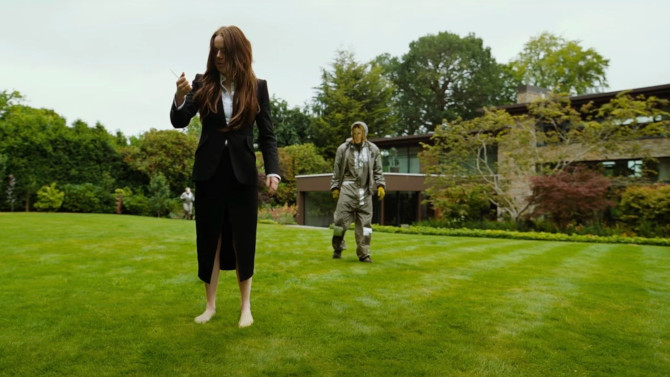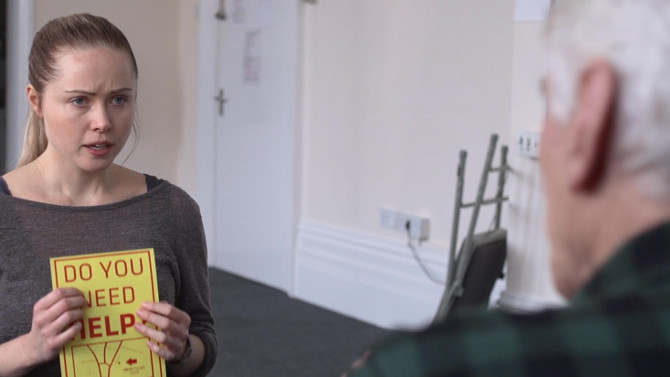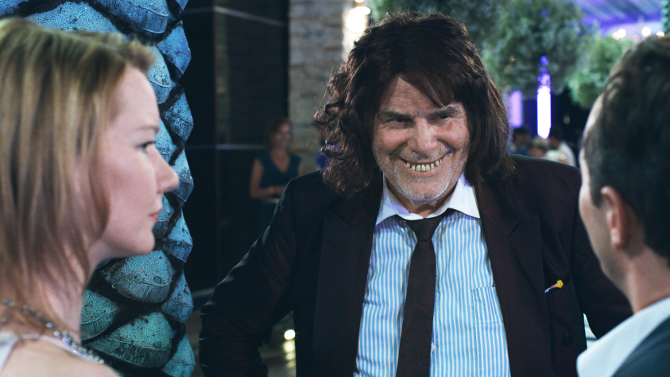
A Bee in Your Bonnet or: A Bug in the System
Sometimes a movie doesn’t fit nicely within a genre box. In today’s case, the film touches on bizarre sci-fi dialogue, brings forth some satirical dark comedy, plenty of drama and thrills, and centers on a crime... in other words, it’s another unique vision from Yorgos Lanthimos (The Lobster; The Favourite) – titled Bugonia (2025). . . inspired by the 2003 South Korean motion picture Save the Green Planet! by Jang Joon-hwan. Falling down the rabbit hole with Teddy (Jesse Plemons – Hostiles; Game Night) and his autistic cousin/helpful sidekick Don (Aidan Delbis – an excellent amateur casting of an autistic man), they have done copious amounts of research on the recesses of the internet into an alien species called the Andromedans – that are supposedly secretly residing amongst us while pulling the puppet strings.
-

Flying the Nest
Lady BirdDecember 10, 2017Indie darling Greta Gerwig makes her solo writing/directorial debut with Lady Bird, a coming of age film that has been building strongly towards the 2017-2018 Awards season. . . earning an almost unheard of rating of 100% on Rotten Tomatoes. Many of the plot points will sound familiar when it comes to a coming of age tale – teen angst, strife between mother and daughter, obsession with sex and losing your virginity, first love, applying for colleges, joining the school theatre club, crushes on teachers and other such things; though, it is not these things that are truly important, but rather the honest, realistic voice in which it is told.
-

CAUTION: Help Needed
Punch BagSeptember 24, 2017Human nature is fickle. For all the good things that come with it, there is a belief, even a drive, to be right. Perhaps best termed a stubborn streak, we feel that we alone can have the appropriate perspective on an issue, leading to countless gripes between neighbours or amongst family members. It is likely that, if we travelled back two thousand years, Ancient Romans would be having similar tiffs in which both believe they are in the right. It is this scenario that comes to life in the absurdist 2017 short film Punch Bag, a dark comedy with a unique vision. Written and directed by Daniel Harding, the narrative follows Naomi (Ingvild Deila), a woman who finds herself in one such similar situation, disgruntled with the intrusive noise of her neighbours. Finding a striking yellow and red pamphlet that offers aid for such matters, she waits outside the business office, growing more hesitant to enter after hearing the lopsided row going on inside.
-

You Won’t Get Sick of This
The Big SickJuly 16, 2017Beginning with a limited release, The Big Sick took hold of the 2017 highest grossing theatre average take, giving the little independent-picture-that-could positive word of mouth, and just as importantly, momentum, going into its wide release this July 14th, 2017 weekend. Labelled as a romantic comedy. . . and there are most definitely many of those elements found within it, in many ways it is the emotional dramatic flourishes that stand out, and, when fused with those laugh induced moments, make for a nuanced, exquisitely crafted dramedy.
-

Persona Non Grata?
Toni ErdmannJune 25, 2017At its heart a story about a complex father/daughter relationship, with 2016's Toni Erdmann, writer/director Maren Ade charts her tale down a highly original course as the pair work out their many issues in the most unorthodox of ways. The German motion picture was nominated for Best Foreign Language Film at the Academy Awards this past year, with many seeing it as the outright favourite. . . it lost to the more politically relevant Iranian film The Salesman – Asghar Farhadi’s second win in this category. Winfried Conradi (Peter Simonischek) is an all-out kook – a prankster who loves playing games with everyone he meets. Like a child in a man’s body, we first meet Winfried as he receives a package from a courier. Claiming that it is his brother’s (and that he was just released from jail for putting bombs in the mail), he leaves, returning moments later with a new outfit and fake teeth, pretending to be his criminally eccentric sibling.
-

Where the heART Is
MaudieMay 19, 2017An intimate character study, 2016's Maudie, written by Sherry White and directed by Aisling Walsh, fuses familial drama with Canadian East Coast humour. Beginning in the 1930's, the story is based on the real life of Canadian folk artist Maud Lewis – the titular character is brought to vivid life by the ultra-talented Sally Hawkins. Born with a bad case of juvenile arthritis, Lewis is a woman of strong will due to her affliction. With a bad limp, awkward disposition and secret from her past, she is seen by the community at large as being different. . . also, a stain upon their family according to her holier-than-thou Aunt Ida (Gabrielle Rose) and overly patriarchal brother, Charles Dowley (Zachary Bennett). One example of his ways – he sells off their parents’ home soon after their death without even telling his sister beforehand.
-

Another Brick in the Wall
I, Daniel BlakeMarch 26, 2017A trenchant piece of social commentary, I, Daniel Blake could have been a one dimensional film filled with gloomy despair, but in the capable hands of director Ken Loach and first time actor and long time comedian Dave Johns, it is laced with deft, dry, sarcastic humour throughout – making it a relevant, multi-faceted dramedy. Written by Paul Laverty (a regular collaborator with Loach), the modern day tale, which is set in Newcastle, England, follows a fifty-nine year old carpenter named Daniel Blake (Johns), who, as the film begins, is frustratingly dealing with a government employee over the phone. They have denied his claim for ‘employment and support allowance’ – despite the fact that he has had a debilitating heart attack and his doctors vehemently state that he is in no shape to return to work. A wonderful piece of sardonic humour, this opening scene finds the man having to put up with a plethora of unrelated questions that have nothing to do with his particular condition. Highlighting the lack of common sense or logic found in the modern day governmental system, it is somewhat akin to a man continuously banging his head around the rim of a toilet seat (it hurts, is irritating and, in the end, gets you absolutely nowhere).
